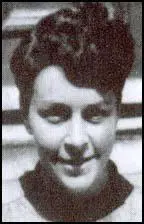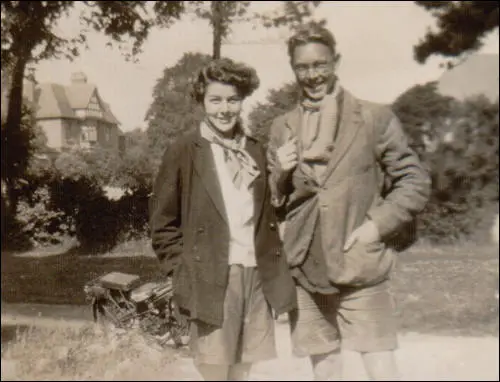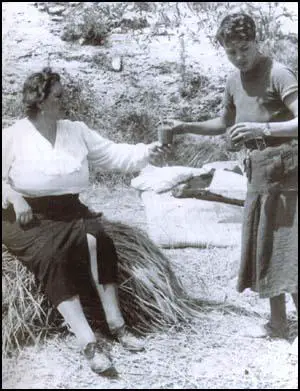Nan Green

Nan Farrow was born in Beeston, near Nottingham, in 1904. Her father had been a manager of a factory and after he lost his job the family lived in poverty.
At the age of fifteen she found work in an insurance office. Nan became interested in politics and joined the Fabian Society. She met and married George Green, a musician. The couple had two children. Her father was furious with her for "tying herself to a wandering musician".
In the early 1930s Nan and George Green joined the Communist Party of Great Britain. On the outbreak of the Spanish Civil War George Green joined the International Brigades.
In 1937 Nan arranged for her two children to go to Summerhill and she went to Spain as an administrator with the British Medical Aid Unit, an organization that had been set-up by the Socialist Medical Association and other progressive groups. Nan served under Len Crome, chief medical officer of the 4th Army.
She later recalled that on her arrival in Spain "I was introduced to my job: Assistant Secretary. The chief Administrator was British, as were the surgeon in charge, theatre sisters, ward sisters (who included three New Zealand nurses) and one or two ambulance drivers."
Nan Green worked at the convalescent hospital at Valdeganga. She helped to organize Saturday night dances for the patients and local people: "Half or more of our patients were sufficiently mobile to dance, but there was great difficulty about partners for them. Village girls in those days could not be touched before marriage by any man other than their fathers or brothers, and to have danced with a stranger was likely to ruin their chance of a husband."
Nan Green was one of those who nursed Harry Dobson when he was wounded at the Battle of the Ebro. She later recalled Leah Manning holding his hand until he died. Manning explained in her memoirs: " He had had his spleen removed and Reggie Saxton had given him a blood transfusion. As I stood by he opened his eyes and spoke my name. I recognised him as a comrade whom I had met at a by-election in South Wales, a miner from Tonypandy named Harry Dobson. Dr. Jolly told me that it was not possible that he could live in fact they thought only a few hours, so I determined to stay by him until the end. Actually, it was fifteen hours before he passed away but I did not leave him during that time and he seemed very happy to have me there."

George Green was also killed in 1938 at Ebro. Nan Green later recalled: "He was killed almost in the last hour of the last day. But I've never felt able to be sorry for him because he was doing the right thing... we all feel that. We had this privilege of being... right straight down the high road of history in the right cause and there hasn't been anything like it since, so flawless and so black and white and so good and so wholesome, and he was doing that and he was sure that we would win... and that's how he died, he died flying as it were, you know, like a bird dies."
Green remained in the country until the International Brigades were withdrawn at the end of 1938. On her return to London she shared a house with Patience Darton. She later recalled: "We were busy all the time... lots of demos in those days... We demanded arms for Spain, and we could often do things... women you see, particularly Nan Green and me because we spoke so nicely that the police didn't stop you in the same way that they did the others."
Darton and Green also attempted to get a meeting with the prime minister, Neville Chamberlain. Green argued that: "Some of the nurses got up a little group, five or six of them I suppose and went to see Mrs Chamberlain to ask in a humanitarian way for help to Spain. When they got to Downing Street they were told that the family were at Chequers so they immediately took two taxies and went off there, but by the time they got to Chequers, there were barricades up at the gates and they'd taken the precaution of taking the press with them, so we got a story but we didn't get anything out of Mrs Chamberlain."

In 1939 Nan Green went with a ship-load of Spanish refugees to Mexico, helping to care for the children on the journey. During the Second World War she worked in Poplar Town Hall as Invasion Defence Officer. In the 1950s Nan Green moved to China where she worked for the Foreign Languages Publishing House in Beijing. On her return to England she became Secretary of the International Brigade Association.
Nan Green became disillusioned with certain aspects of Soviet and Chinese communism in the 1950s. She especially disliked the idolatry surrounding their leaders such as Joseph Stalin and Mao Zedong : Green's son wrote: "she was a highly moral person, the transference of her inherited faith in God becoming one in the possibility of mankind improving its lot by its own efforts; not so much a belief that heaven on earth was possible, but one that posted there was no point in waiting for it to arrive unaided."
Nan Green died in 1984.
Primary Sources
(1) An account of Nan Green's experiences appeared in Women's Voices from the Spanish Civil War, edited by Jim Fyrth and Sally Alexander (1991)
I found myself at Huete, in what was called "the English Hospital". To my profound astonishment, I found George there. Now George had left for Spain with the firm intention of joining the International Brigade as soon as he had delivered his lorry, and I had only a vague idea that he was still in the medical service.
A little while before my arrival he had burned the skin of one arm by getting under his ambulance to examine a choked feed of petrol on a mountain road, and freezing petrol had run down his arm, taking off an area of skin. He had been sent to Huete for treatment and was almost recovered. Meanwhile he was appointed Political Commissar of the hospital. It was pure chance and good fortune that brought us together now. I had not had the ridiculous idea that I was going to Spain "to join my husband" and though I had a deep-down hope that we would meet I had no expectation of this incredible bonus. It was sheer unadulterated joy. Next day I was introduced to my job: Assistant Secretary. The chief Administrator was British, as were the surgeon in charge, theatre sisters, ward sisters (who included three New Zealand nurses) and one or two ambulance drivers. Somewhat to my disillusionment, I found that there were wheels within political wheels, colouring the relations and actions of this group of people. The anti-Communism of the Conservatives and the Labour leadership had its reflection here, and I came to suspect (though never to prove) that the Foreign Office had its finger in this and other pies. Nevertheless, tremendously devoted work was done and the Spanish people (patients, mostly peasants, staff and the villagers of Huete) were a glorious example and lesson to all. The training of village girls as nurses and wardmaids was speeded by their eagerness to learn and their devotion to the work, far out-running the expectations of our nurses. Like Cromwell's men, they knew what they were fighting for, and loved what they knew. I
have never forgotten an old grandmother to whose cave-house (half of Huete's houses consisted of caves hollowed out of the hillside in the village) I went, trying to recruit women for the hospital laundry and linen room. Her daughter, for whom I was searching, was out and she was surrounded by several grandchildren, one or two of whom were of school age. On the whitewashed wall of the cave were stuck some children's drawings done in coloured crayons. "Look", she said pointing proudly to them. "Before the Republic there wasn't a pencil in this village, and now all the children go to school. Yes, my daughter will come and help! Those wounded men are fighting so that our children can learn."
(2) Nan Green, quoted in British Women and the Spanish Civil War (2002)
He was killed almost in the last hour of the last day. But I've never felt able to be sorry for him because he was doing the right thing... we all feel that. We had this privilege of being... right straight down the high road of history in the right cause and there hasn't been anything like it since, so flawless and so black and white and so good and so wholesome, and he was doing that and he was sure that we would win... and that's how he died, he died flying as it were, you know, like a bird dies.
(3) James Hopkins, Into the Heart of the Fire: The British in the Spanish Civil War (1998)
Nan Green's Moscow file, however, offers some remarkable reading. In it is a denunciation of her by Bill Rust, the Daily Worker correspondent in Spain, but, more important, a member of the Central Committee of the CPGB. He charges her with being an "adventurer" and then urges that she be expelled from Spain.
Rust's accusation reflects much about the man and the time. He submits, first, that Green had a sexual liaison with a hospitalized International Brigader whom Rust judged to be "either a Trotskyist or Fascist," and who later deserted. Second, her superior, Dr. Krushmar, made a report "very critical of her work." Third, Krushmar found a letter in her room that was "full of criticisms of the Soviet Union," even though it was unclear who had written it. Rust admitted that "the only criticism" that he could bring with certainty against Green was her friendship with "the very bad element." In a dizzying display of communist logic, he found this sufficient to conclude that "in any case, it is clear that Nan Green should not be permitted to undertake any party work." Not to put too fine a point on it, she could no longer be trusted by the Communist party.
Green herself was under no illusions as to how her behavior might be seen. But Rust knew only the outlines of the story of the troubled hospital where she worked. In her unpublished memoir, which is painfully honest, Green reveals a complex tale of intrigue and deception. Her medical chief, Kushmar, was an addict who was consuming the hospital's supply of morphine. Green's signature was required to order more narcotics. He made sexual advances to her, "not I am sure for my beaux yeux but to neutralise my hostility." The hospital commissar, Frank Ayres, a Yorkshire railwayman who had been a member of the party since its earliest days, had himself become a victim of a whispering campaign because he refused to remove anarchist reading materials from the patients' library. When Ayres returned to England, he left behind a confidential assessment of the hospital personnel with a trusted employee. One of the staff reported Ayres' confidant to be a spy and accused her of having stolen the report, which resulted in her imprisonment. Only after "days of interviews, depositions, counter-depositions, enquiries and table-thumpings" was Green able to obtain her release."'
Upon their return to the hospital at Valdeganga, Kushmar counter-attacked by firing Ayres' assistant and accusing Green of financial mismanagement. He took Green to Albacete "where he made God knows what allegations about me to the authorities (some of whom followed me round to my later jobs though I did not know it until much later." As a consequence of the charges she was dismissed from the hospital. Green refused to do the "wise" thing and "fight my way through the sinister series of events that had led to my dismissal from Valdeganga, and demand vindication." In part it was because she knew she could find work in Barcelona where she was "believed in," and also because the war was at a critical stage, and "I would be wasting every one's time just to put myself in the right again."
There was, however, another reason for her reluctance to fight the injustice that had been done to her. She felt "a stain on my conscience," and with her characteristic honesty described it. In her memoir she wrote, "In the last turbulent days of Valdeganga I had fallen victim to an ephemeral affair with a patient, a man much younger than myself, which in that over-charged atmosphere... had exploded and gone out like a rocket." She realized that it must have become widely known. "I was feeling deeply guilty and wanted to put it behind me." She realized that her retreat from the arena of vilification "was not wise." Kushmar, she knew, "had filed a scurrilous report on me which had reached, not perhaps the medical services but a much higher and more powerful authority, charged with the scrutiny of Communists from all countries." Bill Rust was a member in good standing of this "much higher and more powerful authority," and was close to the center of this "sinister series of events."
Nan Green, a woman of exceptional quality by any standard, was one of the fortunate ones. At the time of the repatriation of the International Brigades in 1938, her party reputation had been restored. The final critique of her read, "I believe she is a genuine and sincere Communist and wants to give the best of her abilities. She is brave and never seeks her own personal comfort. She is the type of Communist who is always working to keep up the morale of those around her." Her previous difficulties with the party were caused by "irresponsible gossips." The grievances against her were "false and actuated by jealousy." Probably by the time her file arrived in Moscow Green was on board a ship, chartered by Wogan Philips and paid for by British contributions, taking 5,000 Spanish refugees to Mexico. At the same time her would-be nemesis, Bill Rust, may have been seeing his book, Britons in Spain, through the press. Both the idealism and the myth making were moving swiftly ahead. Rust wrote his book before the war ended. After Spain, he assumed full-time labors with the Communist Party.

